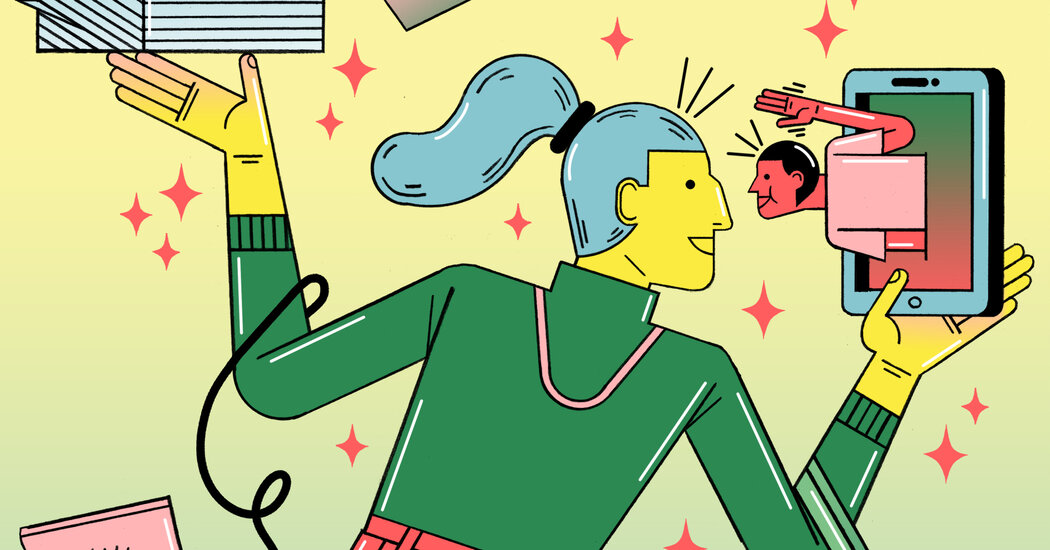
Calling, texting or emailing a friend just to say “hello” might seem like an insignificant gesture — a chore, even, that isn’t worth the effort. Or maybe you worry an unexpected check-in wouldn’t be welcome, as busy as we all tend to be.
But new research suggests that casually reaching out to people in our social circles means more than we realize.
“Even sending a brief message reaching out to check in on someone, just to say ‘Hi,’ that you are thinking of them, and to ask how they’re doing, can be appreciated more than people think,” said Peggy Liu, Ben L. Fryrear Chair in Marketing and an associate professor of business administration with the University of Pittsburgh Katz Graduate School of Business.
Dr. Liu is the lead author of a new study — published in the Journal of Personality and Social Psychology on Monday — that found people tend to underestimate how much friends like hearing from them.
She and her team ran a series of 13 experiments, involving more than 5,900 participants, to get a sense of how good people are at guessing how much friends value being reached out to, and what kinds of interactions are the most powerful.
In some of the experiments, participants reached out to someone they considered to be a friend; in others, they got in touch with someone they were friendly with but considered a weak tie.
Those reaching out were asked to rate how appreciative, happy, pleased and grateful they anticipated the contact would be to hear from them — from not at all to very much.
The researchers then asked those on the receiving end of the check-in to rate how much they appreciated the contact.
Across all 13 experiments, those who initiated contact significantly underestimated how much it would be appreciated.
The more surprising check-ins (from those who hadn’t been in contact recently) tended to be especially powerful.
Dr. Liu and her fellow researchers kept the bar for what counted as reaching out intentionally low: a brief call, text or email, or a small gift, like cookies or a plant.
(The researchers did not focus on social media interactions in the study, but Dr. Liu said there is no reason to hypothesize that reaching out to someone on Facebook or Instagram would be any less meaningful.)
And the fact that these quick, simple check-ins were meaningful will hopefully encourage people to reach out to their social contacts more often “just because,” the researchers said.
Theirs is not the only recent research to emphasize the power of small moments of connection. Another study, published in The American Journal of Geriatric Psychiatry, found that having positive social interactions is linked with a sense of purposefulness in older adults. It adds to the growing body of research that suggests the people we spend time with daily have a “very large impact” on our well-being, said Gabrielle Pfund, a postdoctoral researcher in the department of medical social sciences at Northwestern University’s Feinberg School of Medicine and a researcher on that study. (At the time of the study, Dr. Pfund was working with a team at Washington University in St. Louis.)
Yet the new studies come at a challenging time for friendship and connection in the United States, which is in the throes of a loneliness crisis that has grown more complicated — and more acute — during the pandemic.
People also tend to be hard-wired to assume our friends and acquaintances won’t be as open to us as we’d like, said Marisa Franco, a psychologist and assistant clinical professor at the University of Maryland and author of the forthcoming book “Platonic: How the Science of Attachment Can Help You Make — and Keep — Friends.”
She noted that many people feel awkward about reaching out due to a phenomenon known as the “liking gap,” or the tendency to underestimate how well-liked we really are. People may also hold themselves back because of a similar phenomenon known as the “beautiful mess effect,” which suggests that when we are vulnerable with others, we worry we will be judged harshly. That kind of negativity bias tends to run through all aspects of friendship, Dr. Franco said, and can have a tangible impact on how we behave and interact.
But friendship experts like Dr. Franco say they hope the findings will underscore the need to connect with others on a daily basis, and encourage people to see friendship as an important component of personal health, even if reaching out sometimes feels awkward or time-consuming.
“To be functioning at our best, we need to be in a connected state,” she said. “Just like you need to eat, like you need to drink, you need to be connected to be functioning well.”




